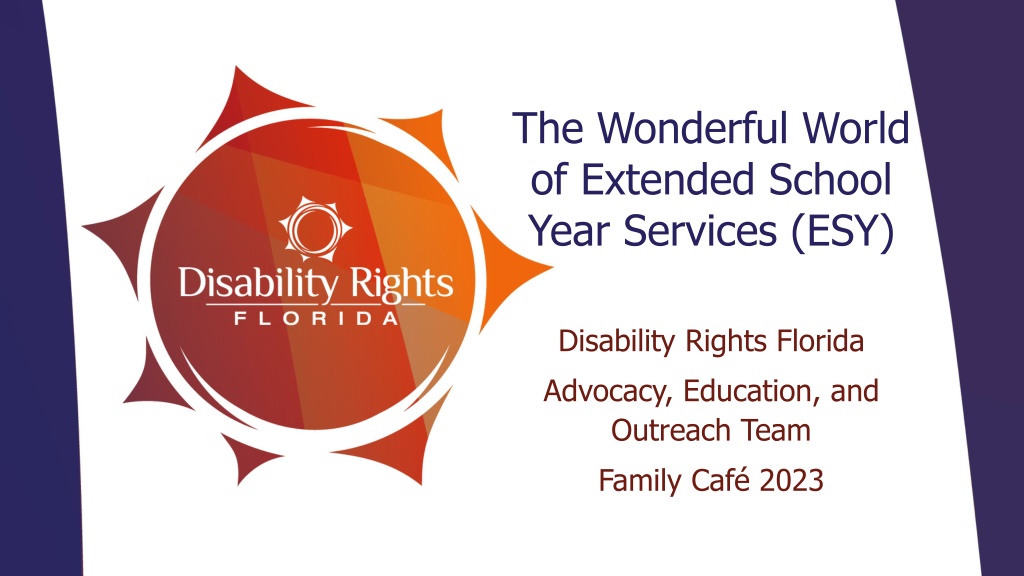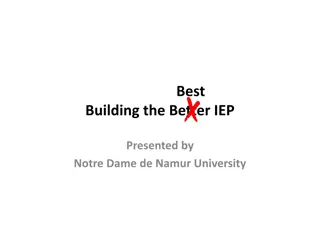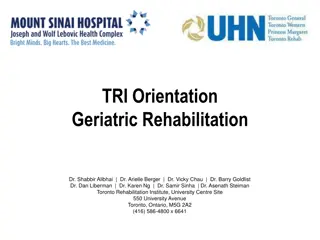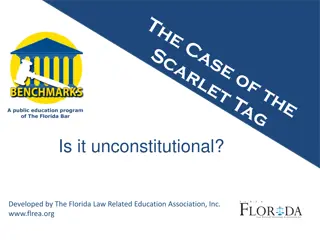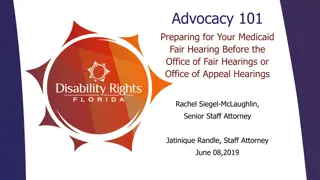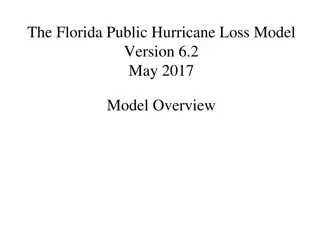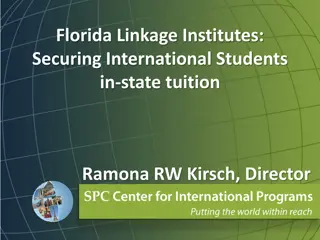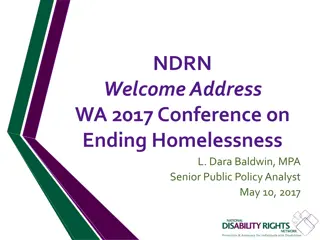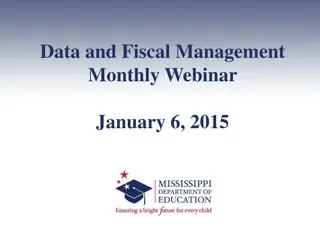Understanding Extended School Year Services (ESY) and Disability Rights in Florida
Explore the world of Extended School Year (ESY) services and Disability Rights in Florida, including information on ESY programs, eligibility, legal authority, and the mission of Disability Rights Florida. Learn about ESY's role in providing special education services to children with disabilities beyond the standard school year. Discover how ESY is created, why it's offered, and who is eligible for these crucial services.
Download Presentation

Please find below an Image/Link to download the presentation.
The content on the website is provided AS IS for your information and personal use only. It may not be sold, licensed, or shared on other websites without obtaining consent from the author. Download presentation by click this link. If you encounter any issues during the download, it is possible that the publisher has removed the file from their server.
E N D
Presentation Transcript
The Wonderful World of Extended School Year Services (ESY) Disability Rights Florida Advocacy, Education, and Outreach Team Family Caf 2023
About Disability Rights Florida Funding, responsibility, and authority under eight federal programs to protect and advocate for the rights of Floridians with disabilities. A not-for-profit corporation since 1987. Offices in Tallahassee, Gainesville, Tampa and Hollywood. Satellite offices in several other communities
Our Mission To advance the quality of life, dignity, equality, self determination, and freedom of choice of persons with disabilities through collaboration, education, advocacy, as well as legal and legislative strategies.
We Will Cover WHAT is ESY? HOW is an ESY program created? WHY is ESY offered? HOW long is ESY? WHEN is ESY eligibility considered? WHERE and WHEN is ESY provided? WHO is eligible for ESY?
Legal Authority Individuals with Disabilities Education Act (IDEA) and Regulations Florida Department of Education Technical Assistance Papers and Guidance State Board of Education Rules
ESY is: "Special Education and related services that are provided to a child with a disability beyond the normal school year of the public agency; in accordance with the child s IEP; and at no cost to the parents of the child. 34 CFR 300.106(b). ESY is a service necessary to ensure a student is receiving a free appropriate public education.
ESY can be: A school-based program On-the-job support Services contracted through the community or other agencies
ESY is NOT: ESY is NOT summer school, reading camp, or any other program available to general education peers. (Although if necessary, these other programs could become a part of a student s ESY program). ESY is NOT child care or respite care, and is not intended to maximize educational opportunity or potential growth.
ESY and Related Services Related Services can be a part of an ESY program The only showing required is that the service is needed to assist a child with a disability to benefit from special education being provided in extended school year programs. Transportation is a related service and is available during ESY if it is necessary for a child with a disability to benefit from special education.
ESY is Offered to Ensure FAPE FAPE is: Free appropriate public education FAPE is special education and related services which have been provided at public expense, under public supervision and direction, and without charge and [which] are provided in conformity with the individual education program. 20 U.S.C. 1401(9) The IDEA requires states receiving federal funds to ensure that ESY services are available as necessary to provide a free appropriate public education (FAPE). 34 C.F.R. 300.106(a)(1)
ESY and FAPE ESY services must be provided if the services are necessary for the provision of FAPE. ESY services may not be limited to particular categories of disability or exceptionality. Services may not be unilaterally limited in type, amount, or duration
When is ESY Eligibility Considered?
ESY Eligibility Consideration The need for ESY is considered at least annually. The annual ESY discussion should take place in the Spring each year and should be made early enough for the family to exercise Due Process Rights if they disagree with the team s decision. ESY eligibility is an IEP Team decision and must not be predetermined or made outside of an IEP team meeting. Ask: Does the student require ESY services in order to receive (FAPE) during the year, or over time?
Where and When is ESY Provided?
Where does ESY take place? It depends on the individual student s need ESY can be provided at a designated school or at an alternate location decided by the IEP team
ESY and LRE LRE stands for least restrictive environment The requirement that a student be educated in the least restrictive environment still applies, but LRE for ESY may be different than LRE for the regular school year A district is not required to create a program solely to provide LRE but it may be necessary to provide services in alternative settings if the most appropriate setting for the student is not available within the existing program (ex: using reading program or summer school as a part of an ESY program).
When does ESY take place? It depends on the need of the individual student ESY typically takes place during the summer months. ESY could take place during any school break, or even during the school term in addition to the regular school day, depending on what the individual student needs to receive their Free Appropriate Public Education.
Determining the Need for ESY (1 of 2) ESY is only offered to students receiving Exceptional Student Education (ESE) services and have an IEP. The IDEA states that [e]ach public agency must ensure that extended school year services are available as necessary to provide FAPE and the need for ESY services must be determined on an individual basis. 34 C.F.R 300.106(a) The United States Department of Education (USDOE) has left it to the states to determine the specific analysis IEP teams should use when determining whether students are eligible for ESY services.
Factors for Consideration Fla. Admin. Code R. 6A-6.03028 (1 of 4) Fla. Admin. Code R. 6A-6.03028(3)(g)(12) (I) Whether there is a likelihood that significant regression will occur in critical life skills related to the following areas: (A) Academics or for prekindergarten children with disabilities, developmentally appropriate pre-academic skills; (B) Communication; (C) Independent functioning and self-sufficiency; and, (D) Social or emotional development or behavior.
Factors for Consideration (2 of 4) (II) Whether the student is at a crucial stage in the development of a critical life skill or an emerging skill and a lapse in services would substantially jeopardize the student s chances of learning that skill; Example: Data indicates that the student is starting to show progress on a goal or skill within their IEP, but they have not yet mastered it and a lapse in services without ESY would result in regression and the student losing what progress they had previously made.
Factors for Consideration (3 of 4) (III) Whether the nature or severity of the student s disability is such that the student would be unlikely to benefit from their education without the provision of ESY services; and,
Factors for Consideration (4 of 4) (IV) Extenuating circumstances pertinent to the student s current situation that indicate the likelihood that FAPE would not be provided without ESY services. Examples include: a student who had recently obtained paid supported employment and requires a job coach in order to be successful; a student who requires services in order to remain in his or her existing least restrictive environment (LRE) and prevent movement to a more restrictive setting; and a student whose frequent health-related absences have significantly impeded progress on goals related to critical life skills.
Determining the Need for ESY (2 of 2) The Florida Department of Education outlined a process for school- based teams to use when determining the need for ESY services. Under this guidance, the school district must consider at least seven factors in determining whether ESY is necessary to provide FAPE to a student. FLDOE stated that no single criterion has been identified as the determining factor for ESY services and ESY services cannot be limited by the use of a formula or single measure.
FLDOEs Seven Listed Criteria Regression/recoupment Critical point of instruction Emerging Skills Nature of severity of disability Interfering behaviors Rate of progress Special circumstances (e.g., transition from school to work)
Appropriate data to review includes, but is not limited to: (1 of 2) Pattern of Regression after past breaks in service Pre-/Post-tests Before/after breaks Progress on annual goals Point Sheet Report Cards Teacher-Made Checklists
Appropriate data to review includes, but is not limited to: (2 of 2) Work Samples Therapy logs Anecdotal records from home/school Probes/running records Frequency Charts Referrals/discipline file Other documentation related to extenuating circumstances
When is a Student Eligible for ESY? When the student is unable to receive a reasonable level of benefit from the regular school year without ESY services When the targeted skill represents a barrier to continuous progress or self- sufficiency IEP teams may not limit the provisions of ESY services to certain types of disabilities and should not discourage parents from sending a student to ESY if it is determined that the student requires ESY services in order to receive FAPE. If there was data to support at least one of FLDOE s seven listed criteria, then the student is eligible for ESY services. They do not need to meet all seven.
How is an ESY Program Created?
How is an ESY program created? The Florida Department of Education (FLDOE) states that the IEP team is responsible for determining the initiation, duration and frequency of ESY services which may be provided for all or part of scheduled school breaks depend[ing] on the unique need of the individual student. ESY services cannot be limited by the use of a formula or a single measure. It is important for IEP teams to consider a variety of factors.
Creating an ESY program ESY programs should be appropriately tailored to meet the needs of the individual child. The IEP team must consider the student s needs and the services necessary to provide FAPE. Districts cannot limit ESY services to particular categories of disabilities and cannot limit the type, amount, or duration of those services unilaterally.
Length and Duration of ESY The IEP team is responsible for determining the initiation, duration, and frequency of ESY services. The number of weeks, days per week, and minutes per day should be based on the student s individual need. School districts may not limit the type, amount, or duration of ESY services.
Misconceptions (1 of 2) X ESY services cannot be discussed by the team because the district is not yet sure what services will be available during ESY X The determination of ESY services cannot be made until the district has confirmed what staff are available to provide ESY services during the summer.
Misconceptions (2 of 2) X I don t know what this question is asking, I m going to check No X A student cannot receive ESY services and participate in course recovery X The other students in the ESY program have much more significant disabilities X ESY is only offered to students with significant cognitive disabilities
Example A: Student demonstrates regression on IEP goals during breaks from school, including long weekends, Thanksgiving, Winter break, Spring break, and Summer break. After receiving ESY services during the summer and during the school year, the student is showing significant progress on all IEP goals. Student s reading, writing, and math skills are at a critical emerging level. Student requires a strict routine and continuous exposure to material to retain information and show academic growth. The student requires 90 minutes of ESY weekly during the long weekends or district approved holiday break during the school year in order to receive FAPE. The student requires 120 minutes of ESY weekly during the whole summer break in order to receive FAPE
Example B: Team completed the Determination of Need worksheet and reviewed academic data. The student needs many reminders and redirection at home and at school. Based on the need for academic instruction, teacher proposed student attend an existing remediation summer camp with second grade curriculum. Mom was concerned that student would shut down in this environment. Team discussed other options that would provide student with academic instruction in an environment that would encourage continued academic growth. Student will receive 7 weeks of ESY services covering reading and math. This instruction will take place 2 days per week for 2.5 hours of services.
Example C: Data showed that during breaks or long weekends student would regress and student was making some progress in both Math and Reading. ESY was set up with a 2 week break in the middle of it, but because the data illustrated the student regressed during long breaks and long weekends the team discussed options. Student will now get 90 min a day of tutoring in the areas of reading and math (along with related services) at home 4 days a week during the 2 week break in the middle of ESY.
Helpful Resources All FLDOE ESY Publications: http://www.fldoe.org/ese/pubxhome.asp Documents in this presentation: Technical Assistance Paper: http://www.fldoe.org/ese/pdf/y2002-5.pdf Teacher Brochure: http://www.fldoe.org/ese/pdf/esyteach.pdf IEP team worksheet: http://www.fldoe.org/ese/pdf/esy-list.pdf
Websites www.DisabilityRightsFlorida.org www.fldoe.org/ese www.Wrightslaw.com
Contact Us: 800.342.0823 www.DisabilityRightsFlorida.org
